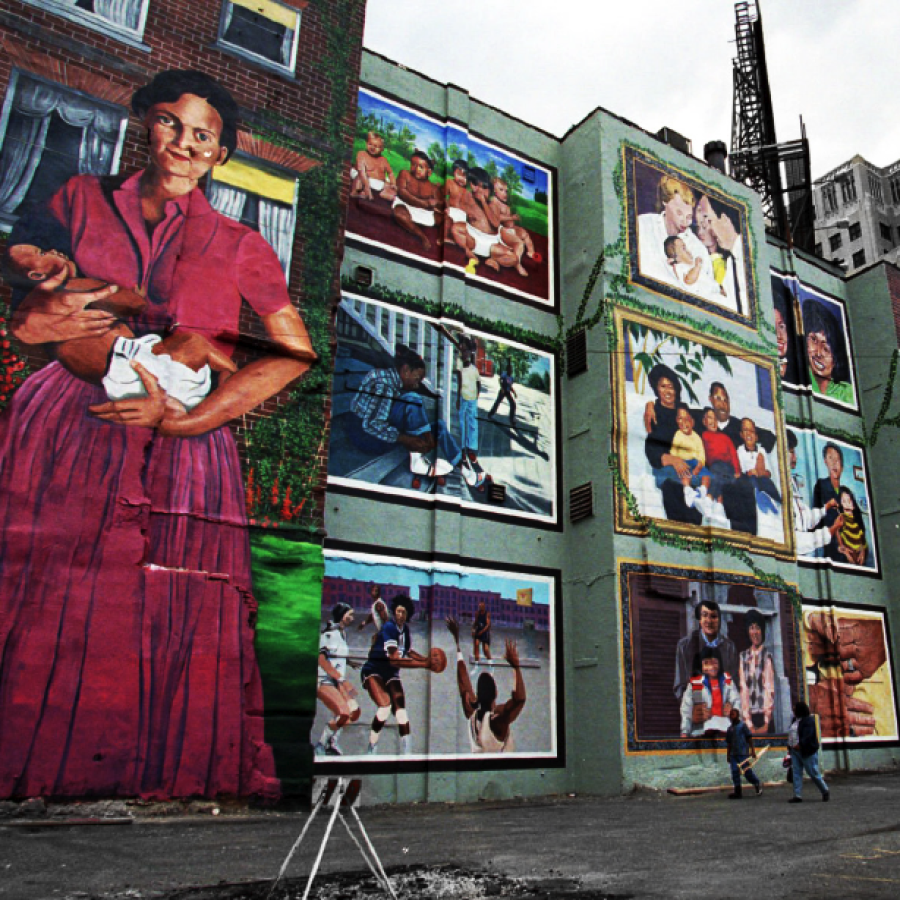Driving Equitable Infrastructure Development in California
Once-in-a-generation federal and state funding opportunities are shifting the landscape around infrastructure development in California. Across the state, community-based and advocacy organizations are shaping decisions around infrastructure project design — where infrastructure is built and how it’s funded. These organizations also are working to secure funding for projects focused on addressing long-standing inequities; promoting climate resiliency; ensuring the benefits of new development extend to communities of color and historically disinvested areas; and binding all of California’s communities together. Their efforts to drive investments that strengthen communities will lay the foundation for a future where every person in California participates in a flourishing multiracial democracy, prosper in an equitable economy, and live in thriving communities of opportunity.
PolicyLink is working across several fronts to build local organizations’ capacity to shape a new paradigm for infrastructure development. Since 2021, we have engaged in a range of in-depth conversations with local and statewide partners to understand what they need in order to tap into and maximize the impact of emerging infrastructure opportunities. Through these engagements, we’ve distilled two vital areas related to California-based organizations' needs:
- Capacity building to leverage existing and new opportunities, and
- Collaborative governance models that foster partnership and disrupt traditional decision-making relationships and power structures.
California Jobs First
California Jobs First, formerly known as the California Economic Resilience Fund (CERF), is a $600 million fund created by the California State Legislature in 2021. The program aims to support communities as they recover from the economic impacts of the Covid-19 pandemic. The state designed California Jobs First to support projects that promote inclusive economic development and climate resilience.
California Jobs First provides local organizations with the opportunity to connect with one of 13 regional entities — high-road transition collaboratives (HRTCs), which are led by a convening institution. Through the program, organizations can shape how regional plans and projects are developed as well as compete in a statewide funding process. The program has three phases:
- Catalyst: Each region can conduct pre-development activities to move their project ideas from abstract concepts to fully fleshed-out scopes.
- Planning: Each region will organize its HRTC and develop regional plans.
- Implementation: Projects within each region's plan will be eligible to be considered for funding through the state's rolling, competitive grant process.
How PolicyLink Supports Organizations Interested in California Jobs First
-
Peer Exchange Series: With a focus on equity and community needs, we facilitate opportunities for participating local organizations, including community-based organizations, grassroots organizations, and other advocacy groups, to come together to share strategies and learn more about California Jobs First.
-
California Jobs First Regional Equity Profiles: The National Equity Atlas — a data and policy tool produced by PolicyLink and the USC Dornsife Equity Research Institute — developed in-depth profiles that feature data and insights local organizations can leverage to build compelling narratives around the factors driving inequity in their regions and communities.
California Jobs First Regional Conveners
If you are a California-based organization, visit opr.ca.gov/economic-development or reach out to your region’s convener:
-
Bay Area (Alameda, Contra Costa, Marin, Napa, San Francisco, San Mateo, Santa Clara, Solano, and Sonoma Counties)
-
Central Coast (Santa Cruz, San Benito, Monterey, San Luis Obispo, Santa Barbara, and Ventura Counties)
-
Central San Joaquin Valley (Fresno, Kings, Madera, and Tulare Counties)
-
Eastern Sierra (Amador, Calaveras, Tuolumne, Mariposa, Alpine, Inyo, and Mono Counties)
-
Inland Empire (San Bernardino and Riverside Counties)
-
North San Joaquin Valley (Merced, Stanislaus, and San Joaquin Counties)
-
North State (Butte, Glenn, Lassen, Modoc, Plumas, Shasta, Sierra, Siskiyou, Tehama, and Trinity Counties)
-
Redwood Coast (Del Norte, Humboldt, Lake, and Mendocino Counties)
-
Sacramento (Colusa, El Dorado, Nevada, Placer, Sacramento, Sutter, Yolo, and Yuba Counties)
-
Southern Border (San Diego and Imperial Counties)
More Information About California Jobs First
For more information about California Jobs First, please contact one of the following team members:
Lupe Garcia

Eugene Canson

Community Economic Mobilization Initiative (CEMI)
The Community Economic Mobilization Initiative (CEMI) is a statewide initiative launched by The Center at Sierra Health Foundation. CEMI supports local organizations that are pursuing historic funding opportunities by building their capacity for inclusive economic development. CEMI is a partnership between UC Santa Cruz’s Institute for Social Transformation, the USC Dornsife Equity Research Institute, and PolicyLink. PolicyLink and its partners serve as CEMI’s technical assistance resource center. We provide training, technical assistance, and other support for more than 40 CEMI grantees.
2023 CEMI Learning Series: Shifting Power at the Table
Shifting Power at the Table is a virtual learning series to develop community-based organizations’ foundational skills, knowledge, and frameworks to advance racial equity in cross-sector planning processes and shape climate-resilient, equitable workforce, and economic development in their regions.
Session 1: Equitable Governance in Cross-Sector Collaboration
May 3, 2023
What does it look like when community and worker representatives share power with public sector and business groups in a formal collaborative?
This session introduces principles and core elements of collaborative governance models explicitly designed to center the leadership of communities historically excluded from planning processes.
Session 1 Materials:
Session 2: Values-Based Data and Analysis
June 1, 2023
How can a values-based approach to data advance racial equity in local and regional planning?
Through community-centered stories and case studies, this session focuses on how organizations can shift the narrative on economic development by using equity-focused data analysis methods and tools. Session 2 also provides a preview of the CERF Regional Equity Profiles, which the National Equity Atlas has developed to support community groups in their regional planning processes.
Session 2 Materials:
Session 3: Anti-Racist Results-Based Accountability
June 26, 2023
How can a program, organization, or multi-stakeholder collaborative design strategies and measure impact in the advancement of racial equity goals?
Antiracist Results-Based Accountability (AR RBA) is an evaluative framework that connects root causes to strategy design and intended impacts and holds enormous potential for systems change work. Session 3 explores the AR RBA framework, its differences from traditional evaluation, and how it’s been applied to collaborative equitable economic development initiatives.
Session 3 Materials:
Session 4: CEMI Convening
July 24-25, 2023
The Center at Sierra Health Foundation hosted the first Community Economic Mobilization Initiative (CEMI) in-person event that convened every CEMI-funded partner. This event, which consisted of a series of presentations and workshops, provided an opportunity for partners to gain a better understanding of CEMI, CERF, and the solidarity economics framework put into action. The event also provided an opportunity for attendees to network with one another.
Session 4 Materials:
Session 5: Introduction to Power Mapping
August 30, 2023
How can community-based organizations build their capacity and knowledge to increase their influence in shaping economic development decision-making?
This session introduced the concept of power mapping, how it’s being applied to understand the decision-making processes that shape our economy, and what it looks like at a regional level.
Session 5 Materials:
More Information About the Community Economic Mobilization Initiative (CEMI)
CEMI Resources










